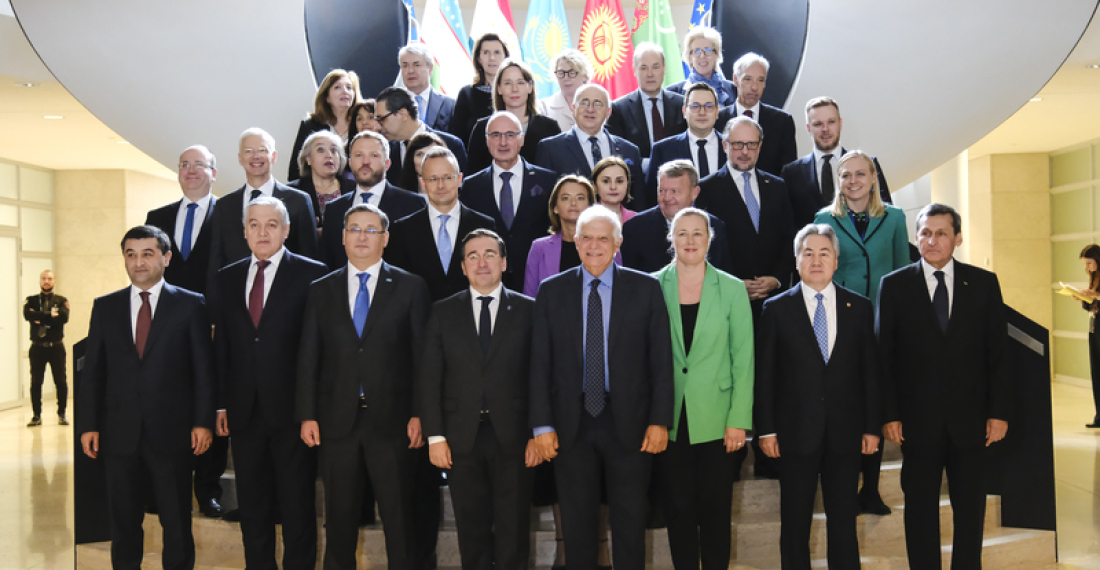|
It was overshadowed by more dramatic events in the world, yet despite this, the 19th EU-Central Asia Ministerial meeting held in Luxembourg on 23 October was a significant event, and another step in the process of building closer co-operation between Europe and the countries of Central Asia. The Foreign Ministers of Kazakhstan, Kyrgyzstan, Tajikistan, Turkmenistan and Uzbekistan participated in the meeting, together - for the first time - with the 27 EU Member States’ Foreign Ministers. The meeting was chaired by EU High Representative Josep Borrell and the European Commission was represented by the Commissioner for International Partnerships Jutta Urpilainen.
A statement from Brussels said that “for the EU, the Ministerial meeting was an opportunity to highlight its strong commitment to the region and stress the importance of deeper cooperation in the context of the challenges emerging from regional dynamics, with a focus on the fall-out of Russia’s war of aggression against Ukraine and the situation in Afghanistan.”
During the Ministerial meeting, participants discussed how to advance inter-regional cooperation on common security challenges, connectivity, economic and trade, environment, water and climate, education, science and innovation issues, and people-to-people contacts, promoting deeper ties between the EU and Central Asia.
Joint Communique reflects the increasingly widening agenda between EU and Central Asia
A joint communique issued after the meeting covered a wide range of issues, and indicated the expanding agenda in the relations between the two group of countries. (See the full text of the Joint Communique here)
Participants reaffirmed the EU’s and Central Asian countries’ determination to uphold the United Nations Charter and the fundamental principles of international law, particularly respect for the independence, sovereignty and territorial integrity of all States. The EU stressed the need to cooperate effectively on preventing circumvention of EU sanctions against Russia through Central Asian territories.
EU-Central Asia Roadmap
The Ministers endorsed the jointly prepared EU-Central Asia Roadmap for Deepening Ties between the EU and Central Asia, as proposed by the President of the European Council and the Presidents of the Central Asian States at their meeting in Cholpon-Ata, Kyrgyzstan on 2 June this year. The road map (read the document here) offers a detailed outline of the steps to be taken to strengthen the relations between the two sides.
The EU and Central Asia look forward to holding the EU-Central Asia Investment Forum on sustainable transport corridors connecting Europe and Central Asia on 29-30 January 2024 in Brussels. The Forum will bring together high-level representatives from the EU and Central Asian states, International Financing Institutions and the private sector. It will aim to enhance and reinforce transport connectivity between the two regions, building on the findings of the 2023 EU-EBRD Study on Sustainable Transport Connections between Europe and Central Asia.
The first ever EU-Central Asia Summit will be held in the second quarter of 2024 in Uzbekistan and Turkmenistan offered to host the next Foreign Ministers meeting, also in 2024.
Ambitious agenda that will require not only political commitment but also public engagement if it is to be implemented successfully
commonspace.eu political editor said in a comment that the documents coming out of the Luxembourg Meeting of EU and Central Asia foreign ministers on 23 October are significant – they are not only declaratory as sometimes such statements are, but also offer a large number of tangible frameworks, proposals and action points that should keep officials on both sides busy for a while. Here however lies the biggest challenge. EU-Central Asia co-operation needs to produce tangible results, including contributing for a better life for the people of Central Asia. The European Union may be making progress in its diplomatic dealings with the region, but needs to work harder on its communications strategy because it is still very far from being able to reach the populations concerned. Here too the Central Asia republics need to get their act together when it comes to their own communications with the European public.
There are references in the documents agreed at the Luxembourg meeting to people-to-people contacts. These contacts need to be expanded, if the relations between EU and Central Asia are to become anything more than a diplomatic exercise with limited impact. It is a reflection of the current reality that section 5 of the “Road Map”, which deals with people to people contacts, is by far the weakest.
The two sides have set an ambitious agenda for their future co-operation, but implementing this agenda is going to require political commitment. That will ensure its success up to a point. More will depend on public engagement on both sides, and securing that may be even more challenging.
|
